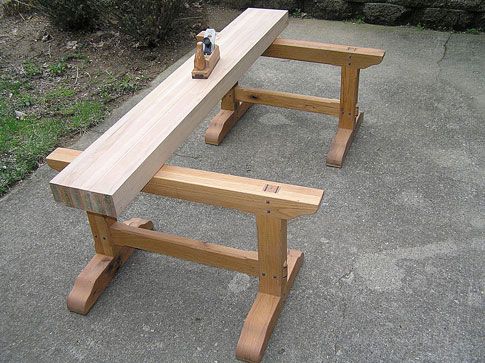We may receive a commission when you use our affiliate links. However, this does not impact our recommendations.
 If you were charmed by Harrelson Stanley’s Japanese workbench, then here is another variant for you that was built by Russ Merz of Cincinnati, Ohio.
If you were charmed by Harrelson Stanley’s Japanese workbench, then here is another variant for you that was built by Russ Merz of Cincinnati, Ohio.
Merz built this bench about seven years ago. The horses were built using scrap oak salvaged from pallets. The beam was built from 2×4 construction lumber.
“I read about these and just had to have one,” Merz writes. “I think you know the feeling.”
Here are the stats: The trestles are 20″ high and 38″ wide. Each foot is 21″ long. The slab is 3-1/8″ x 8-3/4″ x 68″.
So how does he like using the bench? Well, he doesn’t. The parts for the bench usually sit below his European-style workbench. But for our benefit, he dusted them off, set them up outside and snapped these photos.
“Even though I never use this, it was fun making,” Merz writes. “About a year or so after you make this (bench), brush off the dust, sign it, put it on eBay and donate the proceeds to your favorite charity.”
Here are some supplies and tools we find essential in our everyday work around the shop. We may receive a commission from sales referred by our links; however, we have carefully selected these products for their usefulness and quality.








I built 4 very similar trestles (two pair at different heights) ex: 120mm x 48mm ply. Since I use a combination of machine and hand tools, I made these as stationary stands to stack timber on when using a buzzer (planner?), bench saw (table saw), etc. I have found these to be superior in stability and strength to traditional saw horses. I made provision to add an adjustable roller to each trestle to enable them to be used in tailing-off the machines. I am thrilled with the functionality of mine (they are not a patch on the beauty of Russ Merz’s), I would to consider even loaning these out.
chris: i’ve misplaced your e-mail and fone. Could you email me? nothing urgent, just curiousity about you and your harem and assorted projects.
nadine and mark
It’s magic.
No, not really. It’s stops. Did you see this link?
http://www.popularwoodworking.com/woodworking-blogs/chris-schwarz-blog/workbenches/a-japanese-workbench
That shows stops above and below the beam.
As to body posture, we’ll be publishing more as I draw some more Japanese woodworkers into our orbit….
And the bench’s stats have been added in the post above.
Chris
One thing that’s always puzzled me about Japanese trestle benches: how do you keep the bench from skittering out from under you when you’re planing? I know Japanese style planes are used on the pull stroke… so do you back up the nearest trestle with a strategically placed foot? How about western planes?
These look great–especially coming from pallet wood! I love the contrasting wedges and plugs!
One question: How high and how wide are these trestles? They look to be quite wide, say 36 or 40 inches. The high is a puzzle for me–they look very low for planing operation.
Thanks!
–Brian